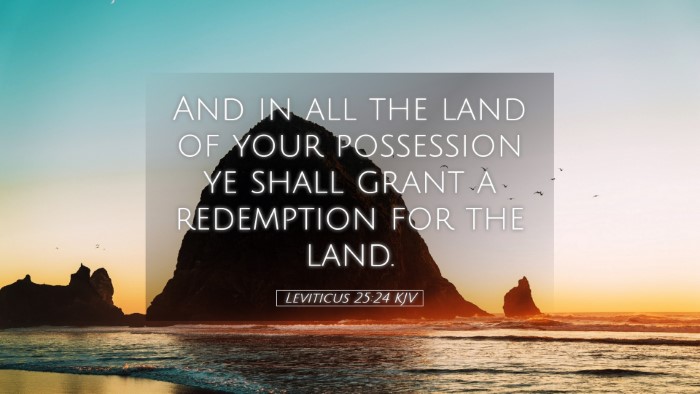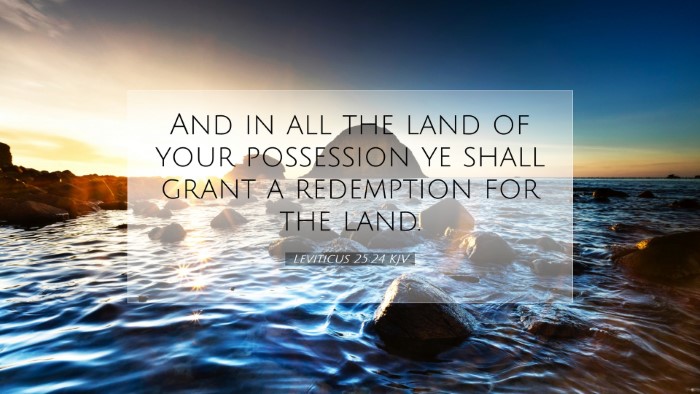Commentary on Leviticus 25:24
Bible Verse: Leviticus 25:24 - "In all the land of your possession, you shall grant a redemption of the land."
Introduction
This verse falls within the larger context of the Jubilee laws and the principle of land stewardship as outlined in Leviticus. The intent of these laws was to ensure both social justice and a continual acknowledgment of God's sovereignty over the land. By examining Leviticus 25:24 through the insights of public domain commentators, we can better appreciate the theological, social, and ethical implications of the text.
Theological Insights
According to Matthew Henry, the directive here is deeply rooted in God's redemptive plan for Israel. The concept of land redemption symbolizes God's ongoing relationship with His people. The land does not ultimately belong to man but to God; thus, the Israelites must maintain an attitude of stewardship rather than ownership.
Albert Barnes emphasizes that the redemption of land serves as a reminder of God’s provision. The Israelites were promised a land flowing with milk and honey, and this notion of redemption ensures that, even if a family falls into hardship, they can regain their inheritance. This reflects a hope that extends beyond mere economic recovery; it underscores the importance of familial and tribal identity.
Social Justice and Equity
Adam Clarke comments on the social implications of this verse, pointing out that it promotes equity in society. The Jubilee laws sought to alleviate poverty and prevent the total loss of familial lands which were integral to their identity and survival. By commanding the Israelites to facilitate the redemption of land, God ensures that every family has the opportunity to reclaim their heritage, thus fostering a sense of community and social justice.
Historical Context
The context of Leviticus, particularly in the chapter regarding the Year of Jubilee (Leviticus 25), indicates a radical approach to economic disparity. Henry notes that these laws were revolutionary in the ancient world. The principle of redemption meant that land could not be permanently sold outside the family, preserving tribal boundaries and promoting solidarity among the tribes of Israel.
Practical Application for Today
In contemporary terms, this verse challenges individuals and communities to reflect on their responsibilities toward those marginalized in society. Barnes mentions that while the specific laws of Jubilee are not applicable in the Christian context, the underlying principles of justice, restoration, and hope are timeless. Churches and faith communities are called to advocate for social justice, ensuring that everyone has access to the resources and opportunities needed for a dignified life.
Spiritual Dimensions
The redemption theme carries profound spiritual implications. Clarke refers to the idea that the ultimate redemption of the land foreshadows Christ’s redemptive work. Just as ancient Israel had the opportunity to reclaim their land, believers are offered the chance to reclaim their lives through Christ. This connection between earthly redemption and spiritual salvation highlights the continuity of God’s covenantal promises.
This notion leads to a broader interpretation of redemption that encompasses not only physical land but also spiritual inheritance. Henry suggests that Christians today should view themselves as sojourners, recognizing their greater possession in the Kingdom of God as contrasted with earthly possessions.
Conclusion
Leviticus 25:24 serves as an essential piece in understanding the broader theme of redemption throughout the Scriptures. Through insights gained from respected commentators, we see a multifaceted approach to the text, focusing on theology, social justice, and spiritual significance. Pastors, students, theologians, and scholars are invited to reflect on this verse, considering how its principles can be applied within their communities today. In doing so, they participate in the ongoing work of restoring not only physical places but also the hearts of those around them.
Reflection Questions
- How can the principles of land redemption be applied in your community?
- In what ways does understanding God as the ultimate owner of the land change your perspective on stewardship?
- What does it mean to you to be part of a covenant community that practices redemption and restoration?


